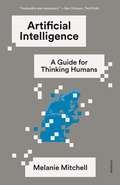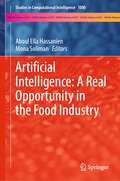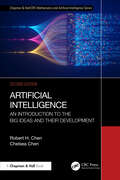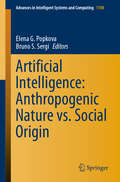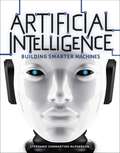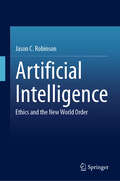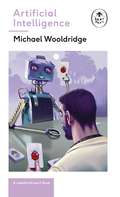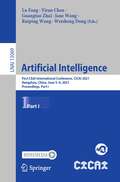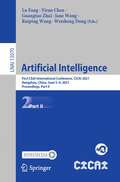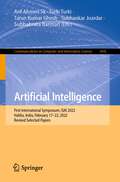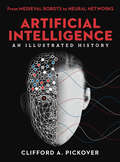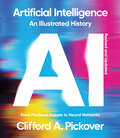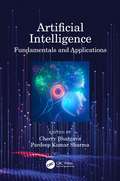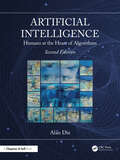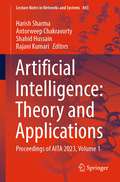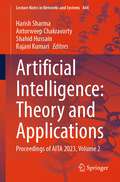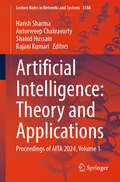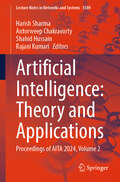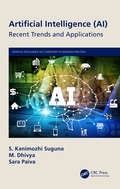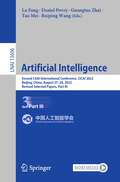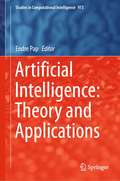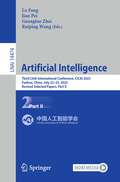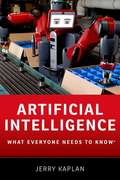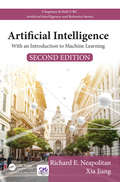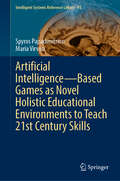- Table View
- List View
Artificial Intelligence: A Guide for Thinking Humans (Pelican Bks.)
by Melanie Mitchell“After reading Mitchell’s guide, you’ll know what you don’t know and what other people don’t know, even though they claim to know it. And that’s invaluable.” —The New York TimesA leading computer scientist brings human sense to the AI bubble.No recent scientific enterprise has proved as alluring, terrifying, and filled with extravagant promise and frustrating setbacks as artificial intelligence. The award-winning author Melanie Mitchell, a leading computer scientist, now reveals AI’s turbulent history and the recent spate of apparent successes, grand hopes, and emerging fears surrounding it.In Artificial Intelligence, Mitchell turns to the most urgent questions concerning AI today: How intelligent—really—are the best AI programs? How do they work? What can they actually do, and when do they fail? How humanlike do we expect them to become, and how soon do we need to worry about them surpassing us? Along the way, she introduces the dominant models of modern AI and machine learning, describing cutting-edge AI programs, their human inventors, and the historical lines of thought underpinning recent achievements. She meets with fellow experts such as Douglas Hofstadter, the cognitive scientist and Pulitzer Prize–winning author of the modern classic Gödel, Escher, Bach, who explains why he is “terrified” about the future of AI. She explores the profound disconnect between the hype and the actual achievements in AI, providing a clear sense of what the field has accomplished and how much further it has to go. Interweaving stories about the science of AI and the people behind it, Artificial Intelligence brims with clear-sighted, captivating, and accessible accounts of the most interesting and provocative modern work in the field, flavored with Mitchell’s humor and personal observations. This frank, lively book is an indispensable guide to understanding today’s AI, its quest for “human-level” intelligence, and its impact on the future for us all.
Artificial Intelligence: A Real Opportunity in the Food Industry (Studies in Computational Intelligence #1000)
by Aboul Ella Hassanien Mona SolimanThis book emphasizes the latest developments and achievements in AI and related technologies with a special focus on food quality. The book describes the applications, and conceptualization of ideas, and critical surveys covering most aspects of AI for food quality.
Artificial Intelligence: An Introduction to the Big Ideas and their Development (Chapman & Hall/CRC Mathematics and Artificial Intelligence Series)
by Robert H. Chen Chelsea ChenArtificial Intelligence: An Introduction to Big Ideas and their Development, Second Edition guides readers through the history and development of artificial intelligence (AI), from its early mathematical beginnings through to the exciting possibilities of its potential future applications. To make this journey as accessible as possible, the authors build their narrative around accounts of some of the more popular and well-known demonstrations of artificial intelligence, including Deep Blue, AlphaGo and even Texas Hold’em, followed by their historical background, so that AI can be seen as a natural development of the mathematics and computer science of AI. As the book proceeds, more technical descriptions are presented at a pace that should be suitable for all levels of readers, gradually building a broad and reasonably deep understanding and appreciation for the basic mathematics, physics, and computer science that is rapidly developing artificial intelligence as it is today. Features Only mathematical prerequisite is an elementary knowledge of calculus. Accessible to anyone with an interest in AI and its mathematics and computer science. Suitable as a supplementary reading for a course in AI or the History of Mathematics and Computer Science in regard to artificial intelligence. New to the Second Edition Fully revised and corrected throughout to bring the material up-to-date. Greater technical detail and exploration of basic mathematical concepts, while retaining the simplicity of explanation of the first edition. Entirely new chapters on large language models (LLMs), ChatGPT, and quantum computing.
Artificial Intelligence: Anthropogenic Nature vs. Social Origin (Advances in Intelligent Systems and Computing #1100)
by Elena G. Popkova Bruno S. SergiThis book presents advanced research studies on the topic of artificial intelligence as a component of social and economic relations and processes. It gathers research papers from the International Research-to-Practice Conference “The 21st Century from the Positions of Modern Science: Intellectual, Digital and Innovative Aspects” (May 23–24, 2019, Nizhny Novgorod, Russia) and the International Research-to-Practice Conference “Economics of Pleasure: a Science of Enjoying Economic Activities” (October 3–5, 2019, Prague, Czech Republic). Both conferences were organized by the Autonomous Non-Profit Organization “Institute of Scientific Communications” (Volgograd). What sets this book apart from other publications on the topic of artificial intelligence is that it approaches AI not as a technological tool, but as an economic entity. Bringing together papers by representatives of various fields of social and human knowledge, it systematically reflects on various economic, social, and legal aspects of the creation, application, and development of artificial intelligence. Given the multidisciplinary nature of its content, the book will appeal to a broad target audience, including those engaged in developing AI (scientific research institutes and universities), and Industry 4.0 enterprises interested in its implementation, as well as state regulators for the digital economy.
Artificial Intelligence: Building Smarter Machines
by Stephanie Sammartino McPhersonIn 2011 a computer named Watson outscored two human competitors on the TV quiz show Jeopardy! and snagged the million-dollar prize. Watson isn't the only machine keeping up with humans. The field of artificial intelligence (AI) is booming, with drones, robots, and computers handling tasks that once only humans could perform. Such advances raise challenging questions. Do Watson and other computers really think? Can machines acquire self-awareness? Is AI a promising or a dangerous technology? No machine, not even Watson, yet comes close to matching human intelligence, but many scientists believe it is only a matter of time before we reach this milestone. What will such a future look like?
Artificial Intelligence: Ethics and the New World Order
by Jason C. RobinsonThis thought-provoking book explores the most promising and threatening technology imaginable—artificial intelligence (AI) or thinking-machines. Following the shocking release of generative AI (ChatGPT) in 2022, questions about the future of humanity and our role as apex minds have exploded with great urgency. The book contributes uniquely to AI conversations in three main ways. First, it broaches questions often ignored by AI developers and tech-enthusiasts, including corporate responsibility and the role technology plays in the widespread manipulation of cultures for profit and power. Second, it asks big and unanswered questions about the nature of thinking, consciousness, morality, purpose, and the good life, as a means of laying the foundation needed to create a better AI. Third, by framing AI evolution in three unique stages of development—Oz, Feallan, and Adouren—it takes readers far beyond the present horizon of large language models. While being accessible to a wide audience, this book offers a thought-provoking examination of the most pressing questions and risks of AI.
Artificial Intelligence: Everything you need to know about the coming AI. A Ladybird Expert Book (The Ladybird Expert Series #27)
by Michael Wooldridge'I propose to consider the question, 'Can machines think?' Alan Turing (1950)Part of the ALL-NEW Ladybird Expert series.This book is for everyone living in the age of Artificial Intelligence. And this is an accessible and authoritative introduction to one of the most important conversations of our time . . . Written by computer scientist Michael Wooldridge, Artificial Intelligence chronicles the development of intelligent machines, from Turing's dream of machines that think, to today's digital assistants like Siri and Alexa. AI is not something that awaits us in the future. Inside you'll learn how we have come to rely on embedded AI software and what a world of ubiquitous AI might look like.What's inside?- The British mathematician Alan Turing- Can machines 'understand'?- Logical and Behavioural AI- The reality of AI today- AI tomorrow- And much more . . . For an adult readership, the Ladybird Expert series is produced in the same iconic small hardback format pioneered by the original Ladybirds. Each beautifully illustrated book features the first new illustrations produced in the original Ladybird style for nearly forty years.
Artificial Intelligence: First CAAI International Conference, CICAI 2021, Hangzhou, China, June 5–6, 2021, Proceedings, Part I (Lecture Notes in Computer Science #13069)
by Guangtao Zhai Jane Wang Yiran Chen Lu Fang Ruiping Wang Weisheng DongThis two-volume set LNCS 13069-13070 constitutes selected papers presented at the First CAAI International Conference on Artificial Intelligence, held in Hangzhou, China, in June 2021. Due to the COVID-19 pandemic the conference was partially held online. The 105 papers were thoroughly reviewed and selected from 307 qualified submissions. The papers are organized in topical sections on applications of AI; computer vision; data mining; explainability, understandability, and verifiability of AI; machine learning; natural language processing; robotics; and other AI related topics.
Artificial Intelligence: First CAAI International Conference, CICAI 2021, Hangzhou, China, June 5–6, 2021, Proceedings, Part II (Lecture Notes in Computer Science #13070)
by Guangtao Zhai Jane Wang Yiran Chen Lu Fang Ruiping Wang Weisheng DongThis two-volume set LNCS 13069-13070 constitutes selected papers presented at the First CAAI International Conference on Artificial Intelligence, held in Hangzhou, China, in June 2021. Due to the COVID-19 pandemic the conference was partially held online. The 105 papers were thoroughly reviewed and selected from 307 qualified submissions. The papers are organized in topical sections on applications of AI; computer vision; data mining; explainability, understandability, and verifiability of AI; machine learning; natural language processing; robotics; and other AI related topics.
Artificial Intelligence: First International Symposium, ISAI 2022, Haldia, India, February 17-22, 2022, Revised Selected Papers (Communications in Computer and Information Science #1695)
by Arif Ahmed Sk Turki Turki Tarun Kumar Ghosh Subhankar Joardar Subhabrata BarmanThis book constitutes the refereed proceedings of the First International Symposium on Artificial Intelligence, ISAI 2022, held in Haldia, India, during February 17-22, 2022. The 30 full papers included in this book were carefully reviewed and selected from 75 submissions. They were organized in topical sections as follows: information systems, mathematics and data analyses; and applied artificial intelligence..
Artificial Intelligence: From Medieval Robots to Neural Networks (Union Square & Co. Illustrated Histories)
by Clifford A. Pickover“This is an addictive stroll through the annals of artificial intelligence, highlighting almost 100 innovations developed between 1300 BCE and 2018” (Booklist).From medieval robots and Boolean algebra to facial recognition, artificial neural networks, and adversarial patches, this fascinating history takes readers on a lively tour through the world of artificial intelligence. Award–winning author Clifford A. Pickover (The Math Book, The Physics Book, Death & the Afterlife) explores the historic and current applications of AI in such diverse fields as computing, medicine, popular culture, mythology, and philosophy, and considers the enduring threat to humanity should AI grow out of control. Across 100 illustrated entries, Pickover provides an entertaining and informative look into when artificial intelligence began, how it developed, where it’s going, and what it means for the future of human-machine interaction.“An enjoyable diversion to read cover to cover, follow along common strands, or dip into for random bits.” —Booklist
Artificial Intelligence: From Medieval Robots to Neural Networks (Union Square & Co. Illustrated Histories)
by Clifford A. PickoverA History of the Future that's Happening Right NowArtificial Intelligence: An Illustrated History explores the historic origins and current applications of AI in such diverse fields as computing, medicine, popular culture, mythology, and philosophy. Through more than 100 entries, award-winning author Clifford A. Pickover, offers a granular, yet accessible, glimpse into the world of AI—from medieval robots and Boolean algebra to facial recognition, and artificial neural networks. First released in 2019, this updated paperback edition brings readers up to speed with coverage of technologies such as DALL-E and ChatGPT, and it explores the very real fear that AI will alter the course of humanity—forever.
Artificial Intelligence: Fundamentals and Applications
by Cherry Bhargava Pradeep Kumar SharmaThis comprehensive reference text discusses the fundamental concepts of artificial intelligence and its applications in a single volume. Artificial Intelligence: Fundamentals and Applications presents a detailed discussion of basic aspects and ethics in the field of artificial intelligence and its applications in areas, including electronic devices and systems, consumer electronics, automobile engineering, manufacturing, robotics and automation, agriculture, banking, and predictive analysis. Aimed at senior undergraduate and graduate students in the field of electrical engineering, electronics engineering, manufacturing engineering, pharmacy, and healthcare, this text: Discusses advances in artificial intelligence and its applications. Presents the predictive analysis and data analysis using artificial intelligence. Covers the algorithms and pseudo-codes for different domains. Discusses the latest development of artificial intelligence in the field of practical speech recognition, machine translation, autonomous vehicles, and household robotics. Covers the applications of artificial intelligence in fields, including pharmacy and healthcare, electronic devices and systems, manufacturing, consumer electronics, and robotics.
Artificial Intelligence: Humans at the Heart of Algorithms
by Alan DixAn authoritative and accessible one-stop resource, the first edition of An Introduction to Artificial Intelligence presented one of the first comprehensive examinations of AI. Designed to provide an understanding of the foundations of artificial intelligence, it examined the central computational techniques employed by AI, including knowledge representation, search, reasoning and learning, as well as the principal application domains of expert systems, natural language, vision, robotics, software agents and cognitive modelling. Many of the major philosophical and ethical issues of AI were also introduced. This new edition expands and revises the book throughout, with new material to augment existing chapters, including short case studies, as well as adding new chapters on explainable AI, big data and deep learning, temporal and web-scale data, statistical methods and data wrangling. It expands the book’s focus on human-centred AI, covering gender, ethnic and social bias, the need for transparency, intelligent user interfaces, and designing interactions to aid machine learning. With detailed, well-illustrated examples and exercises throughout, this book provides a substantial and robust introduction to artificial intelligence in a clear and concise coursebook form. It stands as a core text for all students and computer scientists approaching AI.You can also visit the author website for further resources: https://alandix.com/aibook/.
Artificial Intelligence: Proceedings of AITA 2023, Volume 1 (Lecture Notes in Networks and Systems #843)
by Shahid Hussain Harish Sharma Antorweep Chakravorty Rajani KumariThis book features a collection of high-quality research papers presented at International Conference on Artificial Intelligence: Theory and Applications (AITA 2023), held during 11–12 August 2023 in Bengaluru, India. The book is divided into two volumes and presents original research and review papers related to artificial intelligence and its applications in various domains including health care, finance, transportation, education, and many more.
Artificial Intelligence: Proceedings of AITA 2023, Volume 2 (Lecture Notes in Networks and Systems #844)
by Shahid Hussain Harish Sharma Antorweep Chakravorty Rajani KumariThis book features a collection of high-quality research papers presented at International Conference on Artificial Intelligence: Theory and Applications (AITA 2023), held during 11–12 August 2023 in Bengaluru, India. The book is divided into two volumes and presents original research and review papers related to artificial intelligence and its applications in various domains including health care, finance, transportation, education, and many more.
Artificial Intelligence: Proceedings of AITA 2024, Volume 1 (Lecture Notes in Networks and Systems #5588)
by Shahid Hussain Harish Sharma Antorweep Chakravorty Rajani KumariThis book features a collection of high-quality research papers presented at International Conference on Artificial Intelligence: Theory and Applications (AITA 2024), held during 9–10 August 2024 in Bengaluru, India. The book is divided into two volumes and presents original research and review papers related to artificial intelligence and its applications in various domains including health care, finance, transportation, education, and many more.
Artificial Intelligence: Proceedings of AITA 2024, Volume 2 (Lecture Notes in Networks and Systems #5589)
by Shahid Hussain Harish Sharma Antorweep Chakravorty Rajani KumariThis book features a collection of high-quality research papers presented at International Conference on Artificial Intelligence: Theory and Applications (AITA 2024), held during 9–10 August 2024 in Bengaluru, India. The book is divided into two volumes and presents original research and review papers related to artificial intelligence and its applications in various domains including health care, finance, transportation, education, and many more.
Artificial Intelligence: Recent Trends and Applications (Artificial Intelligence (AI): Elementary to Advanced Practices)
by S. Kanimozhi Suguna, M. Dhivya, and Sara PaivaThis book aims to bring together leading academic scientists, researchers, and research scholars to exchange and share their experiences and research results on all aspects of Artificial Intelligence. The book provides a premier interdisciplinary platform to present practical challenges and adopted solutions. The book addresses the complete functional framework workflow in Artificial Intelligence technology. It explores the basic and high-level concepts and can serve as a manual for the industry for beginners and the more advanced. It covers intelligent and automated systems and its implications to the real-world, and offers data acquisition and case studies related to data-intensive technologies in AI-based applications. The book will be of interest to researchers, professionals, scientists, professors, students of computer science engineering, electronics and communications, as well as information technology.
Artificial Intelligence: Second CAAI International Conference, CICAI 2022, Beijing, China, August 27–28, 2022, Revised Selected Papers, Part III (Lecture Notes in Computer Science #13606)
by Guangtao Zhai Tao Mei Lu Fang Ruiping Wang Daniel PoveyThis three-volume set LNCS 13604-13606 constitutes revised selected papers presented at the Second CAAI International Conference on Artificial Intelligence, held in Beijing, China, in August 2022. CICAI is a summit forum in the field of artificial intelligence and the 2022 forum was hosted by Chinese Association for Artificial Intelligence (CAAI). The 164 papers were thoroughly reviewed and selected from 521 submissions. CICAI aims to establish a global platform for international academic exchange, promote advanced research in AI and its affiliated disciplines such as machine learning, computer vision, natural language, processing, and data mining, amongst others.
Artificial Intelligence: Theory and Applications (Studies in Computational Intelligence #973)
by Endre PapThis book is an up-to-date collection, in AI and environmental research, related to the project ATLAS. AI is used for gaining an understanding of complex research phenomena in the environmental sciences, encompassing heterogeneous, noisy, inaccurate, uncertain, diverse spatio-temporal data and processes. The first part of the book covers new mathematics in the field of AI: aggregation functions with special classes such as triangular norms and copulas, pseudo-analysis, and the introduction to fuzzy systems and decision making. Generalizations of the Choquet integral with applications in decision making as CPT are presented. The second part of the book is devoted to AI in the geo-referenced air pollutants and meteorological data, image processing, machine learning, neural networks, swarm intelligence, robotics, mental well-being and data entry errors. The book is intended for researchers in AI and experts in environmental sciences as well as for Ph.D. students.
Artificial Intelligence: Third CAAI International Conference, CICAI 2023, Fuzhou, China, July 22–23, 2023, Revised Selected Papers, Part II (Lecture Notes in Computer Science #14474)
by Guangtao Zhai Jian Pei Lu Fang Ruiping WangThis two-volume set LNAI 14473-14474 constitutes revised selected papers presented at the Third CAAI International Conference, CICAI 2023, in Fuzhou, China, in July 2023. CICAI is a summit forum in the field of artificial intelligence and the 2023 forum was hosted by Chinese Association for Artificial Intelligence (CAAI). The 100 papers were thoroughly reviewed and selected from 376 submissions. CICAI 2023 conference covers a wide range of of AI generated content, computer vision, machine learning, nature language processing, application of AI, and data mining, amongst others.
Artificial Intelligence: What Everyone Needs to Know
by Jerry KaplanOver the coming decades, Artificial Intelligence will profoundly impact the way we live, work, wage war, play, seek a mate, educate our young, and care for our elderly. It is likely to greatly increase our aggregate wealth, but it will also upend our labor markets, reshuffle our social order, and strain our private and public institutions. Eventually it may alter how we see our place in the universe, as machines pursue goals independent of their creators and outperform us in domains previously believed to be the sole dominion of humans. Whether we regard them as conscious or unwitting, revere them as a new form of life or dismiss them as mere clever appliances, is beside the point. They are likely to play an increasingly critical and intimate role in many aspects of our lives. The emergence of systems capable of independent reasoning and action raises serious questions about just whose interests they are permitted to serve, and what limits our society should place on their creation and use. Deep ethical questions that have bedeviled philosophers for ages will suddenly arrive on the steps of our courthouses. Can a machine be held accountable for its actions? Should intelligent systems enjoy independent rights and responsibilities, or are they simple property? Who should be held responsible when a self-driving car kills a pedestrian? Can your personal robot hold your place in line, or be compelled to testify against you? If it turns out to be possible to upload your mind into a machine, is that still you? The answers may surprise you.
Artificial Intelligence: With an Introduction to Machine Learning (Second Edition) (Chapman & Hall/CRC Artificial Intelligence and Robotics Series)
by Richard E. Neapolitan Xia JiangThe first edition of this popular textbook, Contemporary Artificial Intelligence, provided an accessible and student friendly introduction to AI. This fully revised and expanded update, Artificial Intelligence: With an Introduction to Machine Learning, Second Edition, retains the same accessibility and problem-solving approach, while providing new material and methods. The book is divided into five sections that focus on the most useful techniques that have emerged from AI. The first section of the book covers logic-based methods, while the second section focuses on probability-based methods. Emergent intelligence is featured in the third section and explores evolutionary computation and methods based on swarm intelligence. The newest section comes next and provides a detailed overview of neural networks and deep learning. The final section of the book focuses on natural language understanding. Suitable for undergraduate and beginning graduate students, this class-tested textbook provides students and other readers with key AI methods and algorithms for solving challenging problems involving systems that behave intelligently in specialized domains such as medical and software diagnostics, financial decision making, speech and text recognition, genetic analysis, and more.
Artificial Intelligence—Based Games as Novel Holistic Educational Environments to Teach 21st Century Skills (Intelligent Systems Reference Library #93)
by Maria Virvou Spyros PapadimitriouThis book offers a visionary look at how AI can promote learning for modern skillsets by examining the fusion of AI, prosocial gaming, personalisation, ethics, and education. The book introduces the EPATHLO Suite, a novel AI platform that personalises both educational content and gameplay, creating tailor-made learning experiences and entertainment for each student. By blending personalised games with education, these AI-driven environments make learning more dynamic and enjoyable, while focusing on prosocial behaviour development, encouraging cooperation, empathy, and ethical understanding. It also provides roles for human teachers, as content creators of the EPATHLO Suite authoring tool. The book highlights the importance of twenty-first-century skills—such as critical thinking, collaboration, communication, and creativity—while also addressing ethical issues like data privacy (including GDPR compliance). It provides practical AI-driven solutions and reviews relevant literature, offering a comprehensive understanding of these interconnected fields. This book is an indispensable resource for those looking to explore these state-of-the-art topics. It is ideal for academics, researchers, students, educators, game designers, programmers, and professionals in the educational gaming industry who want to understand AI's role in shaping the future of education with games. Whether readers aim to enhance their classroom, develop new learning technologies, or better grasp the evolving technology of educational games with AI, this book offers valuable knowledge and practical tools for success.
